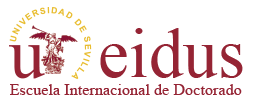Constitution of the Examining Board and Public Defense of the Thesis
- The call for the defense act will be issued within a maximum period of six months from the end of the established period for thesis deposit, when this has elapsed without objections, and in a public session at the University of Seville facilities on a working and academic day.
- The examining board will be constituted prior to the doctoral thesis defense act with the presence of its titular members or, where applicable, their substitutes.
- When, after all titular and substitute members have been summoned, it is not possible to substitute the former who do not attend the defense act, the examining board may be constituted with four members, provided that at least three are external to the University of Seville or the entities represented in the Management Committee of EIDUS, who collaborate with the program, or who, in the case of joint programs, participate in the doctoral program. In such a case, after the defense act has been held, the secretary of the board will send, along with the minutes, justification for the absence of the members who did not participate in the act.
- The examining board that evaluates the thesis will have access to the doctoral student's activity document, with the training activities carried out, and the reports from external experts, as well as, where applicable, the doctoral student's response to them. The activity document will not result in a quantitative score but will constitute a qualitative evaluation instrument that will complement the doctoral thesis evaluation. These three documents will be provided by EIDUS to the secretary of the board.
- The act will consist of the presentation and defense by the doctoral student of the elaborated research work before the members of the examining board. The secretary of the board will draw up minutes of the defense act.
Learn more: Arts. 84 to 88 of the Doctoral Studies Regulations
Doctoral Thesis Evaluation
- After the thesis defense and discussion, the examining board will determine, behind closed doors, the overall grade awarded to the doctoral thesis according to the following scale: Not Pass, Pass, Merit, and Excellent.
- Each member of the examining board will submit a written report on the evaluation of the thesis. The vote for the cum laude mention will be carried out through the platform developed by the University of Seville, which guarantees anonymity in the issuance and counting of votes. This vote will take place in a separate session after the doctoral thesis defense.
- The secretary will draw up the thesis evaluation minutes, which will include information related to the conduct of the defense act and the grade, as well as, where applicable, compliance with the reading requirements for obtaining the international modality of the doctoral degree, and the remaining circumstances provided for in these regulations.
- The documentation comprising the defense minutes must be sent to the technical secretariat of EIDUS by the secretary of the examining board using means that ensure the confidentiality and safekeeping of the documentation. This documentation will be received by the EIDUS administrative staff.
Learn more: Arts. 89 and 90 of the Doctoral Studies Regulations
What documents comprise the doctoral thesis defense minutes?
The documents that make up the minutes and evaluation of the doctoral thesis can be downloaded from: Doctoral Thesis Examining Board Forms
More information: Doctoral Thesis Examining Boards

 English
English  Español
Español